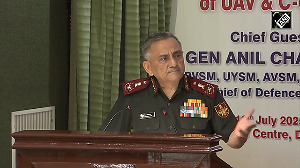The United States has asked Pakistan to squeeze the dangerous Haqqani network, Secretary of State Hillary Clinton said as she underlined that it has been made clear to Islamabad that trying to distinguish between "good and bad terrorists" is self-defeating and dangerous.
"Our commanders on the ground are increasingly concerned about the ability of insurgents to conduct attacks from safe havens across the border in Pakistan," Clinton told members of the powerful House of Representatives' Committee on foreign affairs during a Congressional hearing on Pakistan and Afghanistan.
Testifying before Congress after a trip to the region, Clinton said she delivered a "frank" message to Pakistan that it was urgent to act against the extremist Haqqani network, which she blamed for anti-US attacks in Afghanistan.
"So in Islamabad last week, General Dempsey, Director Petraeus and I delivered a single, unified message. We urged Pakistan's civilian and military leadership to join us in squeezing the Haqqani Network from both sides of the border and in closing the safe havens," she said.
"I explained that trying to distinguish between so-called good terrorists and bad terrorists is ultimately self-defeating and dangerous. No one who targets innocent civilians of any nationality should be tolerated or protected," Clinton said.
The secretary of State was in Afghanistan and Pakistan along with the Chairman of the Joint Chiefs of Staff, General Dempsey, and the CIA Director, David Petraeus.
"We underscored to our Pakistani counterparts the urgency of the task at hand, and we had detailed and frank conversations about the concrete steps both sides need to take to advance what we believe are shared interests," she said.
Clinton used unusually strong language during last week's trip to Pakistan, underlining that Washington's tolerance has worn thin after the Haqqani network repeatedly targeting Americans, including through a 19-hour siege of the US embassy in Kabul.
In a blunt message to Pakistan, Clinton demanded greater cooperation from Pakistan to "squeeze" the Haqqani network, saying Islamabad could not keep "snakes" in its backyard to strike its neighbours.
"It's like that old story - you can't keep snakes in your backyard and expect them only to bite your neighbours. Eventually those snakes are going to turn on whoever has them in the backyard," Clinton said during a joint news conference with Foreign Minister Hina Rabbani Khar in Islamabad.
Speaking on Thursday during the Congressional hearing on Capitol Hill, several influential Congressmen expressed their concern over the current policies of Pakistan with regard to fighting terrorism.
"Our two countries are at a crossroads. We cannot sustain a partnership with Islamabad if it pursues policies that are hostile to US interests and jeopardise American lives," said Congresswoman Ileana Ros-Lehtinen, Chairman of the House Foreign Affairs Committee.
"Can the relationship be salvaged and can our strategic objectives in Afghanistan and Pakistan be brought into better alignment? It is hard to be optimistic," she said.
She said all the options on the table "appear deeply unappetizing. "All run the risk of being ineffectual, counterproductive, or both," Ros-Lehtinen stressed.
Referring to the recent statement of Admiral Mike Mullen, Chairman of the Joint Chiefs of Staff, who has now retired, that Haqqani network is the "veritable arm" of the powerful Pakistani spy agency ISI, Ranking member of the panel, Howard Berman, raised questions about Islamabad's commitment to work with the US to defeat terrorist.
"Given the current climate, I support the administration's decision to pause security assistance to Islamabad until Pakistan shows real progress in combating terrorist groups," he said.
The top Congressman was for reevaluating "all military aid to Islamabad to ensure that it is meeting its intended purpose," but quickly added that it would be a mistake to slash US economic assistance to Pakistan.






